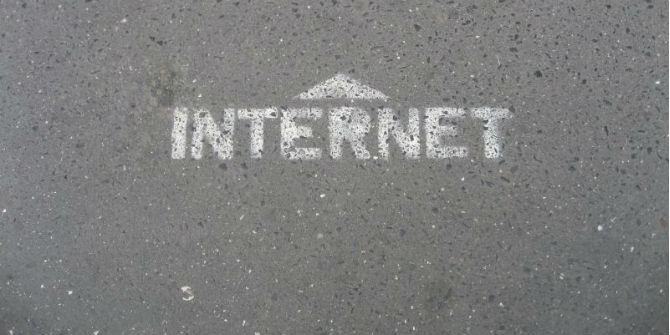 As governments seek to tackle misinformation and other problems posed by the digital age, digital (or media) literacy is often cited as a significant part of any solution, and the UK government’s White Paper on Online Harms (consultation closing on July 1) has proposed the development of an online media literacy strategy. Gianfranco Polizzi, a PhD researcher here at the LSE, and Ros Taylor, who worked on the LSE Truth, Trust and Technology Commission, have just published a policy brief which outlines the current challenges facing digital literacy, and key recommendations.
As governments seek to tackle misinformation and other problems posed by the digital age, digital (or media) literacy is often cited as a significant part of any solution, and the UK government’s White Paper on Online Harms (consultation closing on July 1) has proposed the development of an online media literacy strategy. Gianfranco Polizzi, a PhD researcher here at the LSE, and Ros Taylor, who worked on the LSE Truth, Trust and Technology Commission, have just published a policy brief which outlines the current challenges facing digital literacy, and key recommendations.
There are growing concerns about misinformation within our democratic societies, which rely on a well-informed citizenry. While misinformation has always existed, in the digital age it can spread far more quickly and widely, and how to stop it is a big question. On the one hand, digital platforms have a responsibility to ensure that they are not (mis)used for spreading misinformation. On the other hand, equipping children and adults with digital literacy is key for them to evaluate online content and identify misinformation.
Digital literacy is a variant of media literacy, which refers to the ability to access, analyse, evaluate and create messages in a variety of forms. In its key report, the LSE’s Truth, Trust and Technology Commission (T3) recommended that digital literacy should be embedded within the mainstream curriculum. To follow up on this recommendation, Ros Taylor and I have written a policy brief on misinformation and the UK school curriculum, which can be read here. In this blog post, I wish to present the main points of our policy brief, focusing on the five key challenges to, and our recommendations for, promoting digital literacy.
Challenges with the current legislation, national curriculum and teaching resources
- Challenge no. 1: There is no clear framework on how to promote digital literacy
The UK Government recently published a white paper on online harms that promises “a comprehensive mapping exercise to identify what actions are already underway” to promote digital literacy, along with “an online media literacy strategy”. It is unclear what such an exercise and strategy would entail and lead to, and whether the Department for Education (DfE) would be involved. A 2019 report by the Digital, Culture, Media and Sport (DCMS) Select Committee called for digital literacy to be the “fourth pillar of education alongside reading, writing and maths,” but the Government rejected the recommendation, responding that digital literacy “is already taught across the national curriculum”. Besides DfE, according to the Communications Act 2003, Ofcom is in charge of promoting media literacy. But apart from doing research, it “has retrenched from efforts to promote” it.
- Challenge no. 2: The Government thinks the national curriculum needs no revision… But it does
While the Government is reluctant to revise the curriculum, there is evidence that shows that it should. A recent report by the National Literacy Trust found that only 2% of primary and school children know how to spot misinformation. And 53.5% of teachers think the curriculum should be revised to equip children with the skills and knowledge they need.
- Challenge no. 3: The national curriculum falls short of teaching primary and secondary school children about the broader digital environment, and how to use their digital skills and knowledge to evaluate online information
Traditional subjects like English, History and Maths encourage critical thinking by promoting analysis and evaluation skills based on respect for evidence. But they overlook how the internet can be used to fact-check, its implications for society, and how to differentiate bias and misrepresentation from deliberately fabricated misinformation. The Citizenship curriculum teaches students about the socio-political system and the press, but not the broader digital environment. The Computing curriculum teaches students practical digital skills, but not how to deploy their skills to evaluate online content. It does not teach them how the algorithms of social media contribute to misinformation by making content visible, despite its trustworthiness. Nor that such algorithms create filter bubbles that expose users to information that reinforces their pre-existing beliefs. Unlike Computing, Media Studies encourages students to understand the broader media ecosystem, but it is optional at GCSE and A levels. As a result, it was taken by only 7.3% of GCSE students in 2017.
- Challenge no. 4: Existing teaching resources focus more on media bias than online misinformation. As with the national curriculum, they do not encourage students to use their digital skills and knowledge to evaluate online content
To mention a few examples, AQA and the Association for Citizenship Education provide teaching resources for Media Studies and Citizenship that focus more on traditional media bias than online misinformation. Computing at School, Google, EDUQAS, SecEd and STEM offer Computing resources that help students develop practical digital skills. But they do not teach them how to deploy their skills to evaluate information by using, for instance, different search engines or fact-checking sites. This also applies to PSHE, NewsWise and the National Literacy Trust. The latter offers resources for traditional subjects on media bias and fake news. But as with those available on Tes, their resources do not teach students how to fact-check online and use multiple sources in synergy with knowledge about how algorithms facilitate misinformation and the internet’s implications for society. Finally, most of the resources mentioned above consist of handouts and multimedia content, and do not encourage students to evaluate information by using the internet.
- Challenge no. 5: Teachers need training
There is a lack of evidence on whether school teachers know how to spot misinformation themselves. We know from a 2017 Royal Society report that the most common request among Computing teachers is to receive training. Following their 2018 evidence review, the National Literacy Trust has also emphasised that all teachers need adequate training to teach children the skills and knowledge they need to identify misinformation.
Recommendations
Given these five key challenges, we recommend in our policy brief that:
- Together with relevant stakeholders, the UK Government should establish a clear framework on how to promote digital literacy. It needs to clarify what steps will be taken, what they entail, and whether and how Ofcom and DfE will be involved.
- The national curriculum should be revised. Citizenship and Computing teach students, respectively, about traditional media and democracy, and practical digital skills. But they should also teach about the broader digital environment and how to deploy digital skills and knowledge to assess online content.
- We need teaching resources that focus more on misinformation and encourage students to use the internet to evaluate online content by deploying digital skills and knowledge about the digital environment.
- We need further research on school teachers’ digital literacy levels.
- The Government and DfE should ensure that teachers know how to teach digital literacy across the national curriculum. Digital literacy training should be part of Initial Teacher Training (ITT) and Continuing Professional Development (CPD) programmes.
This article gives the views of the author and does not represent the position of the LSE Media Policy Project blog, nor of the London School of Economics and Political Science.





